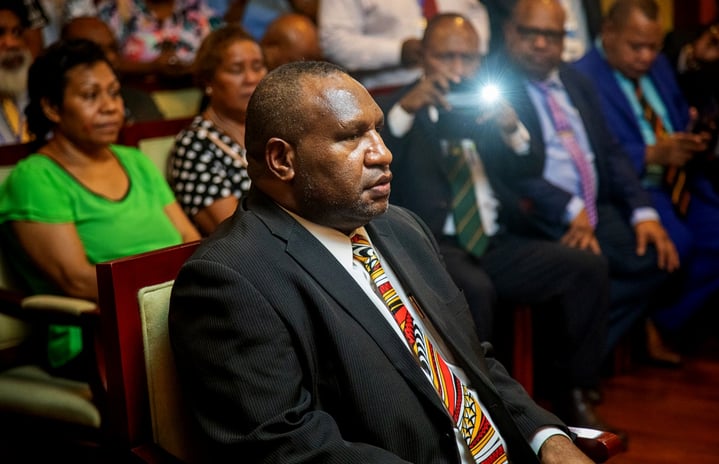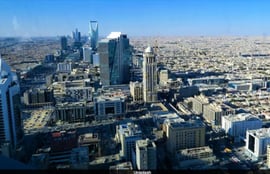Former finance minister James Marape was elected Papua New Guinea's new prime minister Thursday and immediately issued a fiery nationalistic address that put foreign resource companies on notice.
The former finance minister threatened foreign logging companies and vowed to "tweak" resource laws that underpin a recently inked $13 billion gas deal with Total and ExxonMobil.
Hours after being elected, Marape told parliamentarians he does "not intend to chase away our investors" but insisted "our resource laws are outdated," a clear reference to the huge LNG project.
"Who says one conglomerate from outside will come and tell me I can change the law for my country?" he asked.
"I have every right to tweak and turn resource laws for my country," he said. "We will look into maximising gain from what God has given this country from all natural resources."
One of Asia's most impoverished nations, Papua New Guinea is rich in natural resources, which include large gas fields.
The ExxonMobil and Total Papua LNG project, signed in April, would almost double Papua New Guinea's gas exports and make the country a significant global player.
Marape -- who comes from energy-rich Hela province -- had in April resigned from the government, complaining the spoils of that contract were not equitably distributed.
He also said Papua New Guineans "don't need" foreign companies operating in the country's lucrative timber export sector.
Tighter global logging rules and widespread deforestation in Indonesia have seen loggers -- predominantly from China -- turn their attention to Papua New Guinea's extensive forests.
- Rhetoric or action? -
Earlier on Thursday Marape won the landslide backing of members of parliament, after weeks of political manoeuvring that forced eight-year prime minister Peter O'Neill to resign.
His tenure was marked by endemic corruption and chronic underdevelopment, in a country that has increasingly become a venue for US-China rivalry.
The government's purchase last year of 40 Maseratis to ferry foreign dignitaries around Port Moresby's few fully paved roads during an APEC summit became emblematic of his time in office.
Marape, aged 64, said his victory represented power shifting to a new generation and away from O'Neill's top-down approach to one more suited to the country's complex tribal, regional and ethnic politics.
Likening himself to a "choirmaster", Marape urged members of both parties who backed him in a 101-8 vote to unify.
"Every one of you can sing your part. Some of you will sing the bass parts; some of you will sing the soprano, the alto, the melody."
"Together, we can make the song that our children truly deserve."
Marape's tenure could also spell a rocky patch for PNG-Australia relations.
He had previously demanded an investigation into "corrupt contracts" with Australia to settle asylum seekers on tropical island camps, which he said had sullied the country's image.
It remains to be seen if his premiership brings substantive reforms or tinkering around the edges.
Many Papua New Guineans -- only 13 percent of whom have access to reliable electricity -- will be suspicious Marape's appointment is little more than musical chairs among the country's distant elite.
Much may hinge on who Marape appoints to his cabinet and how much delay the policy rethink takes.
"Papua New Guineans are suffering," former prime minister Mekere Morauta warned Marape in an address to parliament. "You will need to address corruption and abuse, mismanagement of finances and mounting debt."
"The people of Papua New Guinea want change."
Lowy Institute analyst Jonathan Pryke said Marape's appointment signals continuity, but key policies could yet be revisited.
"We will likely see... recent agreements signed with Total energy over a new LNG project reviewed and renegotiated.
"I don't think Marape is hostile towards the natural resource sector, but he is eager to see the benefits going to the Highlands, to landowners and to the PNG people to be maximised."
Energy analysts have warned that any delay to the LNG project could make it less attractive, with similar projects in Africa and Latin America competing to meet the same projected market shortfall in the mid-2020s.
Port Moresby, Papua New Guinea | AFP




